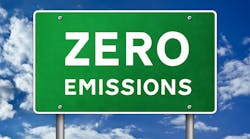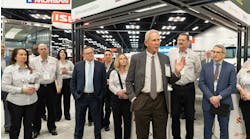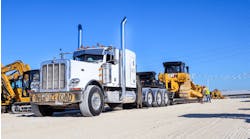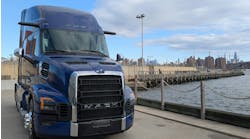California Gov. Gavin Newsom made an aggressive move toward cutting diesel emissions on Sept. 23 with an executive order requiring sales of all new passenger vehicles to be zero-emission by 2035 and additional measures to eliminate emissions from the transportation sector.
In addition, the California Air Resources Board (CARB) will develop regulations to mandate that all operations of medium- and heavy-duty vehicles be 100% zero-emission by 2045 “where feasible,” with the mandate going into effect by 2035 for drayage trucks.
The transportation sector is responsible for more than half of all of California’s carbon pollution, 80% of smog-forming pollution, and 95% of toxic diesel emissions, according to the governor’s office.
To ensure needed infrastructure to support zero-emission vehicles, the order requires state agencies, in partnership with the private sector, to accelerate deployment of affordable fueling and charging options. It also requires support of new and used zero-emission vehicle markets to provide broad access to zero-emission vehicles for all Californians. The executive order will not prevent Californians from owning gasoline-powered cars or selling them on the used-car market.
In the last six months, CARB has approved new regulations requiring truck manufacturers to transition to electric zero-emission trucks beginning in 2024. Newsom, along with the governors of 14 other states, as well as the mayor of Washington, D.C., recently agreed to a pact called the Multi-State Medium- and Heavy-Duty Zero-Emission Vehicle Memorandum of Understanding (MOU), which calls for only new medium- and heavy-duty zero-emission trucks and buses to be sold in their jurisdiction by 2050. They set a 30% goal of zero-emission commercial vehicles by 2030, which will be reassessed in 2025 as new data comes in.
The MOU has been signed by the governors of California, Colorado, Connecticut, Hawaii, Maine, Maryland, Massachusetts, New Jersey, New York, North Carolina, Oregon, Pennsylvania, Rhode Island, Vermont, and Washington, as well as the mayor of Washington, D.C.
Over the next six months, the signatories will develop a multi-state action plan to increase the feasibility of zero-emission vehicles, such as battery-electric trucks, which are more costly than diesel- and gasoline-powered trucks and lack comprehensive fueling/charging infrastructure. According to the MOU, a Multi-State ZEV Task Force will address financial and non-financial incentives related to vehicles and infrastructure, deployment strategies, outreach and education, how to work with utilities, weight restrictions, data standards, and more.



